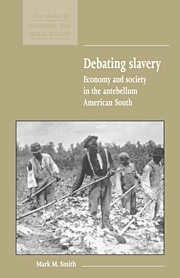Book contents
- Frontmatter
- Contents
- List of figures
- List of tables
- Preface
- 1 The contours of a debate
- 2 Slaveholders and plantations
- 3 Yeomen and non-slaveowners
- 4 Slaves
- 5 The profitability of slavery as a business
- 6 The Profitability of slavery as a system
- 7 New directions, toward consensus
- Bibliography
- Index
- Economic History Society
- New Studies in Economic and Social History
- Studies in Economic and Social History
Preface
Published online by Cambridge University Press: 05 June 2012
- Frontmatter
- Contents
- List of figures
- List of tables
- Preface
- 1 The contours of a debate
- 2 Slaveholders and plantations
- 3 Yeomen and non-slaveowners
- 4 Slaves
- 5 The profitability of slavery as a business
- 6 The Profitability of slavery as a system
- 7 New directions, toward consensus
- Bibliography
- Index
- Economic History Society
- New Studies in Economic and Social History
- Studies in Economic and Social History
Summary
How we measure our freedom is as much a product of how we evaluate and assess our past as it is of how we characterize and experience our present. The subjects of this study, economic and social aspects of slavery in the antebellum American South, are as relevant to our understanding of contemporary society and liberal capitalism as they are to our historical understanding of southern slavery. With the recent fall of the other major alternative to democratic capitalism, communism, we are perhaps more inclined than ever to view liberal democratic capitalism as the truest form of all historical freedoms. Yet, as the stupendous economic growth of politically conservative, totalitarian societies like China reminds us, other alternatives that promise tremendous economic profit while simultaneously denying political freedom do exist. Southern slavery is an historical reminder of another alternative that, up to 1865, was vigorously embraced by a substantial proportion of the United States. In many ways this study is an indirect answer to a direct question: how different was antebellum slavery from modern democratic capitalism? The study is dedicated to showing how various historians have answered this question.
My former students at the University of Birmingham, England, and my current ones at the University of South Carolina have heard and, in turn, helped shape, much of what is in this study. Students demand clarity in the presentation and construction of arguments and it is with this demand in mind that I have written.
- Type
- Chapter
- Information
- Debating SlaveryEconomy and Society in the Antebellum American South, pp. xi - xiiPublisher: Cambridge University PressPrint publication year: 1998

